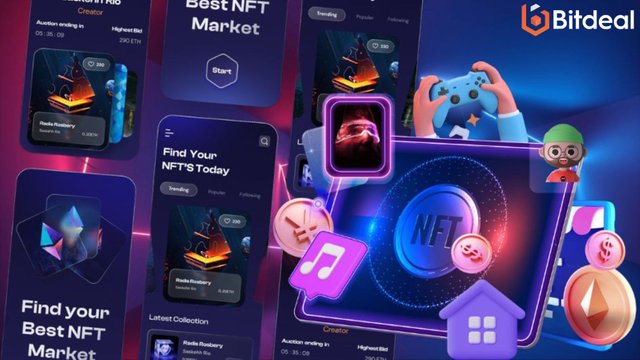
The emergence of NFTs has created a new market for creators and collectors alike, as they provide a new way to buy, sell, and trade digital assets. As a result, there has been a surge in the number of NFT exchanges, which are platforms that allow individuals to buy, sell, and trade NFTs. It is one of the reasons why businesses are approaching NFT Exchange Development companies.
What is NFT Exchange?
NFT exchange is a platform or marketplace that allows users to buy, sell, and trade non-fungible tokens (NFTs). NFTs are unique digital assets that are stored on a blockchain and cannot be replicated or divided into smaller units, making them one-of-a-kind and valuable. NFT exchanges facilitate the trading of NFTs between buyers and sellers, much like a traditional stock exchange or marketplace. These exchanges provide a platform for users to list their NFTs for sale, set a price, and wait for a buyer to make a purchase.
Launching an NFT exchange platform involves various technical, legal, and business aspects. Here is a possible roadmap for launching an NFT exchange platform:
Conduct market research: Before launching an NFT exchange platform, conduct market research to understand the market size, competition, and user preferences. Identify potential users, artists, and creators who may be interested in using the platform.
Define the business model: Decide on the business model for the NFT exchange platform. This could involve charging a commission on NFT sales, a monthly subscription fee, or other monetization strategies.
Technical requirements: Determine the technical requirements for the platform, including the blockchain network, smart contract development, and digital wallet integration. Consider the scalability, security, and performance of the platform.
Legal and regulatory compliance: Ensure that the platform complies with legal and regulatory requirements in the jurisdiction where it operates. This may involve obtaining licenses, complying with anti-money laundering (AML) and know-your-customer (KYC) regulations, and data protection laws.
Develop the platform: Hire a team of developers and designers to build the NFT exchange platform. Develop the user interface, digital wallet integration, smart contract development, and other technical features required for the platform. On the other hand, simply consult an NFT Development Company that offers, NFT Exchange Development services.
Test and deploy: Test the platform thoroughly to ensure that it works as intended. Deploy the platform on a testnet or staging environment before launching it on the mainnet.
Launch and marketing: Once the platform is ready, launch it to the public. Develop a marketing strategy to promote the platform to potential users and creators. Consider partnering with artists, influencers, and creators to promote the platform.
Maintain and improve: After launching the platform, maintain and improve it by fixing bugs, adding new features, and addressing user feedback. Consider hosting events or contests to engage users and promote the platform.
Secure storage of NFTs: Determine the storage requirements for NFTs to ensure their security and protection from theft or hacking. Consider implementing offline storage solutions and multi-factor authentication for user accounts.
Partner with reputable blockchain networks: Partner with reputable blockchain networks to ensure the reliability and integrity of the NFT exchange platform. Consider partnering with multiple networks to provide users with a variety of options.
Build a community: Develop a community of users, artists, and creators around the NFT exchange platform. Encourage user engagement and provide forums or social media channels for users to connect and share their experiences.
Provide customer support: Provide customer support to users to ensure that their questions and concerns are addressed promptly. Consider offering a knowledge base or frequently asked questions (FAQ) section to address common queries.
Create a revenue model: Determine the revenue model for the NFT exchange platform. Consider offering a percentage of the sale price as a commission or charging fees for specific services such as minting or listing NFTs.
Expand platform offerings: Consider expanding the platform offerings beyond NFTs to include other digital assets such as tokens or cryptocurrencies. This can provide users with a more comprehensive platform for trading and exchanging digital assets.
Foster innovation: Foster innovation by encouraging artists, creators, and developers to create unique NFTs and tools that enhance the platform's capabilities. Consider hosting hackathons or providing grants to incentivize innovation on the platform.
Wrapping Up Thoughts
NFT exchanges are new & upgraded business modules in the world of NFTs. Many popular platforms like Binance, Opensea, and more. NFT exchanges are offering more user-friendly experiences and better engagement rates. Bitdeal is one of the leading NFT Development companies offering class-leading NFT exchange platform development solutions worldwide. Connect with our team of experts for free demos and quotes.